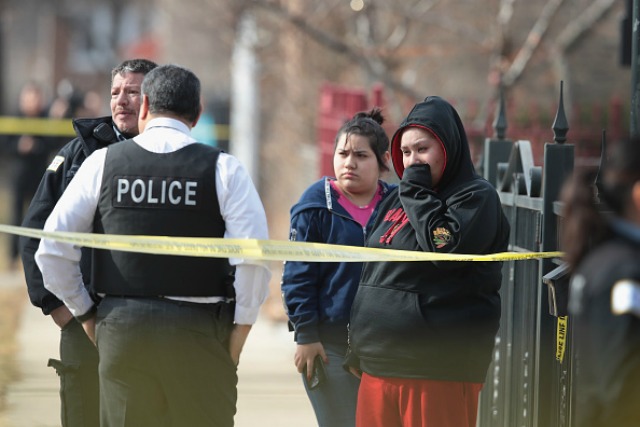The Devastating, Long-Term Toll Violence Takes On Chicago Kids
By Stephen Gossett in News on Mar 20, 2017 8:10PM

Getty Images / Photo: Scott Olson
Like a steady drip, the tally of shootings in Chicago ticks up by the day. As it does, the raw data regularly makes its way to the national media stage—and, at times, even as a mention in the president’s tweets. But the figures alone barely begin to tell the story of the long-term trauma that kids suffer when exposed to such violence.
Health experts are more and more coming to terms with the psychological and physical toll that exposure to violence takes on children—and that toll is quite devastating. Life expectancy, brain development, long-term psychology and more are all "dramatically" impacted by trauma, like that which many kids in Chicago's hardest-hit areas face, according to Colleen Cicchetti, executive director at the Center for Childhood Resilience at Lurie Children's Hospital.
Researchers have recently expanded upon the groundbreaking research of Adverse Childhood Experiences studies from the last 10 to 15 years. People who have suffered more than four traumatic events under the of 18—events which range from parental separation to having an incarcerated household member—have "dramatically increased" likelihoods of both mental and physical trauma. For example, the likelihood of a suicide attempt jumps of 10 times; and the likelihood of being an intravenous drug user jumps up 12 times, Cicchetti said.
You're also twice as likely to develop physical issues—ranging from cancer to stroke to cardiovascular disease—if you top four traumatic events.
"Early childhood experiences are impacting health in a big way," Cicchetti said.
As such studies were replicated beyond inter-familial events, looking at community violence and beyond, researchers also charted changes in brain development caused by trauma. "The neural pathways and some of the cognitive capacity is impacted," Cicchetti said. Among the most notable is the impact caused by an extended fight or flight response.
Kids who suffer that prolonged survival mechanism are not only psychologically affected, but they also suffer physiological shutdowns. The body's natural immunization is weakened. The child has a harder time staying not getting sick. Hormonal changes are impacted. And neural pathways can be altered. That leads to a state of "hyper-arousal" in the brain, according to Cicchetti.
There's also a vicious-circle pattern, which means exposure to violence at young ages can fuel trauma in later generations, according to Gene Liebler, the Executive Director of our Behavioral Health department at La Rabida Children’s Hospital.
"In the overwhelming majority of these cases, the parent is coming in with trauma history, too," Liebler said. That trauma then affects the person's ability to function as an adult and as a caregiver—a cycle which can play out in the neighborhood at large, too. "We see the same things in communities. Kids that are traumatized in communities stay in the communities, and it never really ends. When parents are trying to handle their own history of trauma, they don’t have ability to provide to care. So much energy is bound up in one;s own history of harm."
Cichetti was one of the doctors who helped draft a new bill that announced on Sunday by Sen. Dick Durbin and US Rep. Danny Davis (D-IL) and members of the Illinois health community. The Trauma Informed Care for Children and Families Act would allocate existing funding toward child trauma programs and help expand training for front-line educators on how to work with children who have been left unable to properly regulate emotion due to trauma exposure.
As it stands, there's no good funding mechanism to get mental health services to schools, the bill's proponents argue—at a time when the research has made it increasingly clear just how damaging exposure to violence is, especially for young people.